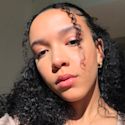I’ve had a tumultuous relationship with my hair, always vacillating between admiring my curls’ versatility and resenting its unwillingness to conform. At age 16, I bought my own flat iron and mastered a sleek silk press. But by the time I reached my 20s, I realized that the more heat-damaged my hair became, the less I felt like my authentic self. In the name of practicing self-love and reviving my heat-damaged texture, I embarked on my curly hair journey. I was in desperate need of practical guidance. How could I revive my curl pattern? What products should I be using? Which ingredients would keep my hair healthy? It seemed like a lot, especially when caring for your own curls is an entirely new-to-you practice. Truthfully, I’m still figuring things out.
If this journey is as winding as a strand of my hair, then celebrity hairstylist Vernon François is true north. He’s well renowned for his work styling curls, tight textures, and coils—just look at the hair on Serena Williams, Lupita Nyong'o, Angela Bassett, and Elaine Welteroth for proof. And when I reached out to him for his advice on navigating the curly hair journey, he said this: “Know that the hair you were born with is good enough, and beautiful just as it is.” Below, find the rest of his insightful tips for making it through the transition—they’re the closest thing to a map you’re going to get.
The Starting Point
François stresses that if you’re looking to embrace your hair’s true texture, consistency and patience is a must. There’s no one-and-done treatment that will spring your curls back to life, nor is there such a thing as a miracle in a bottle. “Don’t expect change to happen overnight, especially if you’ve been stretching your hair out with heat or tight hairstyles and want to start showing its kinks or curls,” he tells me. Caring for curly hair entails using a range of nourishing products that work cohesively—the amount you use, your application technique, and your consistency is key.
Lay Off The Suds
Sulfates, when exposed to water, create that foamy feeling you expect from shampoo. They can also strip your hair strands of moisture. “Whichever shampoo you use for kinky, coily, curly or wavy hair, I’d always recommend it’s sulfate free,” says François. Curly hair is naturally dry, and the name of the game is holding on to moisture, not stripping it away. François recommends his Curl Shampoo for S-shaped curls and buoyant spirals, while the Pure Fro Shampoo is best for corkscrew curls and tight coils. But you don’t have to stick to one line to find sulfate-free shampoo—I also love Maui Moisture’s Heal & Hydrate Shea Butter Shampoo, a sulfate-free, moisturizing shampoo available at the drugstore.
Master The Art of the "Double Detangle"
“I always say that the best tools for detangling and styling kinks and curls are your hands and fingers,” says François, because they allow for more sensitivity. If you feel any knots or tangles, you can gently massage them out. “You’re far less likely to accidentally rip or break the hair that way,” he adds. Once the tangles are addressed, you can go back in with a special detangling brush to define your curl pattern. I like to split my hair into several sections and use either the EZ Detangler Brush or the Pattern Beauty Shower Brush—both minimize breakage and hair loss.
Explore Conditioner Country
The most effective, gentle way to detangle my hair is while it’s slathered in conditioner. François’ Curl Conditioner defines, detangles, and strengthens curls, and the Pure Fro Conditioner is more deeply moisturizing for coily textures. If you’re looking to splurge, I love to use Moroccanoil’s Curl Enhancing Conditioner as a quick deep conditioning treatment. Once I’m finished detangling, I let it sit in my hair for three minutes before rinsing.
Next, you’ve got your leave-ins and oils: it’s all about adding moisture by layering different conditioning products. A leave-in conditioner is essential for wash day because it instantly revives hair post-shampoo. I like to add It’s a 10 Miracle Leave-In on slightly damp hair to soften and strengthen my curls. François makes a version too—his Leave-In Conditioner uses plant extracts, amino acids, and natural oils to revitalize and moisturize curls. And, another word on oils: they’re crucial for promoting healthier hair because, as in skincare, oils help seal moisture into your hair. Which to choose? You can’t go wrong with a simple argan oil—it deeply penetrates curls to lock in moisture and shine. But if you’re ready to level up to something more targeted, François has some suggestions. “Baobab oil is very moisturizing and helps to enhance kinks and curls, while castor oil is great for building strength,” he explains. At the end of my routine, I separate my hair into four sections, add four drops of oil to each, and use my fingers to gently spread it through my curls.
Cross The Sea of Style & Sculpt
Whether I shape my curls to finish or let my pattern flow freely, styling cream is a must. François’ Styling Cream creates a soft and silky feel for healthy looking curls, and Pattern Beauty Styling Cream is perfect for molding your curls into twists, braids and bantu-knots. It smells like sweet buttercream and can also be used for a defined wash-and-go look. Also consider how you’re styling your hair for bedtime—before you turn off the lights, curly hair needs a bit of prep work. “Ideally, sleep with hair in a silk cap or on a silk pillow,” says François. My nighttime hair care routine includes a version of both: I gather my curls into a high ponytail, wrap a silk scarf around my head, and sleep on a comfy silk pillowcase.
“Above all, be kind to yourself and your hair,” emphasizes François. Wherever you are in your unique curly hair journey, let that advice be your guiding light. Bon voyage!
—Lauren Tappan
Photo via ITG

